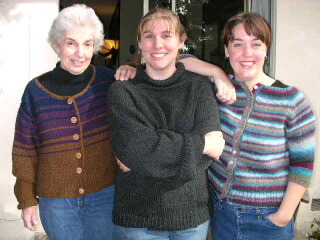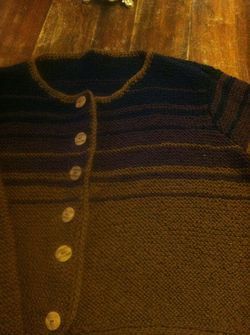Pensive
I'm a bit pensive tonight, having spent the last few hours going through things of my mother's. She died four years ago, but sometimes it aches like it was just a few weeks ago, and other times it's still impossible that it's true. How can a mother just go away? It's unthinkable. Unbearable.
And then you think it, and you bear it.
This past weekend, while Lala and I were camping in Bodega Bay, my sisters went south to go through some boxes that had somehow been overlooked when we tried to go through Mom's things four years ago. It turns out there were a lot of boxes.
Guess what they found?
The sweater I made her.
The sweater I wrote an entire essay about in my book, A Life in Stitches. I wondered about lost things in that chapter--how a mother devoted to losing nothing could lose something I knew she cherished, the sweater I'd made for her from wool from Ashburton, New Zealand, her hometown.
Seen tonight on our dining table
Yeah. She didn't lose it. It was packed away. She died in June; she'd probably packed it with her other winter woolens in April or so. Twice a year, she went through her closet and packed up the out-of-season wear, putting it in the garage to wait for the appropriate heat/cold to roll around again. How could I have not thought of that? She loved routines. Lists. File folders. (I spent this afternoon writing out a massive, thorough camping checklist which made me giddy.)
My sisters also brought some more of her writing to me. We shared that, Mom and I. Both of us wanted to be writers so badly and we both achieved that dream. In fact, before either of us were published, she took me to my first writing conference at Cuesta Community College in San Luis Obispo. We went to the same classes, and both of us took detailed notes that we saved. We ate lunch in the cafeteria and goggled at the published writers (she was more suave than I was, having met many of the local authors through her bookstore jobs).
And tonight, sitting with her papers, I found her most authentic voice, the one I've been looking for for years now. It was in a surprising place. She published dozens of articles and wrote a newspaper column for years. Every time I'd read a piece, I'd start with hope and then begin skimming, hoping for the meat. The feeling. The fear, the joy, the loss, the confusion, the happiness.
Instead, Mom wrote like a journalist. Everything was beautifully well-written and impeccably well-researched. When asked to present a speech on her most recent trip to New Zealand to the Arroyo Grande Ladies' Club, she prepared a talk on the history of the islands (not on what I hoped I'd find: how she felt about seeing her own mother's grave for the first time). When she wrote about going through Super-Typhoon Kim, she discussed how to dry books on a lawn after a 200 mph typhoon, not how it felt to live through something that hadn't happened in more than 500 years.
Then I opened her file folder from the creative writing class she took a few years before she died. And I found her there.
In the in-class, handwritten, uncompleted essays, I found my little mama. She started an essay about the typhoon by saying she "was as frightened as I've ever been in my life." She remembered giggling with her friend Helen in the forties as her father drove them to the beach, a once-a-year delight. In an essay about her daughters' high school graduations, it's what she doesn't say that's telling. She starts to write how she was a bit more teary when her second daughter Christy crossed the podium--but then she stops and veers to a description of how girls in heels totter on the grassy football field. She automatically self-censors something that might be wrong to share (but it's okay, Mom! Christy was valedictorian in a school of 2,000! We were all more teary that day, as we should have been).
It makes me think about my own writing. No one would ever accuse me of not sharing my feelings. It's possible I share them too much. But in the same way she kept to herself, because it was made her feel good, I run here to the blog, or to my journal, to drop my feelings all over the place because it's what makes me feel whole.
Feelings like: I've been blue, and I think it's the hormones (or lack thereof). Running has been helping, and I'm exercising every single day, and monitoring my moods as best I can. See how easy that is for me to tell you? Although my menopause is surgical and not natural, I don't know how my mother's was, because I never asked her and she didn't volunteer things like that. (Ladies, if you can, call your mothers. Ask.) I don't know if she felt blue, and I don't know if she had terrible hot flashes or not. Did she lose sleep? Did her migraines stop? Not knowing makes me sad, which is exactly what I'm trying to crawl out of, and THERE I DID IT AGAIN with the telling you about how I feel.
But that's what we want, right? As people? We want to know how others feel because we're all basically selfish at the core, and we want to compare those feelings to our own and then talk (or not talk!) about them.
In the back of that class's binder, I found a complete, typed essay for the class on how my middle name was almost Shea, after the dump-truck driver who helped my father make sure she was safely out of the Corvair they'd been trapped inside during a flood (my mother, full-term with me, couldn't get out the window as my father had done). A helicopter (the dump truck's boss) followed them overhead as they walked home, to make sure they got there safely.
I loved that essay. And then I noticed its title, and I pretty much came undone.
"Happiness."
She might not have talked much about emotion, but when she did, it packed a punch. That's another kind of writing power, one I could learn from, I think.
Clementine, almost home from camping. Another kind of happy.
*By the way, I'm teaching three classes at that same writer's conference down south at Cuesta College in September. That is just...that is just amazing. And that is all.






